CTP-ISW continues to assess that Iran and its Axis of Resistance will likely conduct a coordinated strike targeting Israel in retaliation for the death of former Hamas Political Bureau head Ismail Haniyeh on July 31. Iranian Supreme Leader Ali Khamenei has continued to communicate that Iran will retaliate “forcefully” against Israel to restore deterrence. Three anonymous Iranian officials told the New York Times that Khamenei ordered a direct strike on Israel during the SNSC meeting on August 7.[i] Khamenei later published a statement that blamed Israel directly and vowed retaliation, and his personal website published an article on August 8 arguing that it is Iran’s duty to seek retribution for the death of Haniyeh.[ii] The article stated that Iran is prepared to respond with “authority.”[iii] Other top Iranian officials who would be involved in the planning and execution of the strike have also threatened Israel in response to Haniyeh’s death. Islamic Revolutionary Guards Corps Deputy Commander Brigadier General Ali Fadavi stated that Khamenei has ordered Iranian forces to “harshly punish” Israel for the death of Haniyeh.[iv] IRGC Quds Force Commander Brigadier General Esmail Ghaani similarly restated Khamenei’s orders to ”avenge” Haniyeh’s death in a letter to Hamas’ new Political Bureau head Yahya Sinwar on August 9.[v] Ghaani reassured Sinwar that Iran will inflict a harsh punishment on Israel for Haniyeh’s death. Khamenei holds ultimate decision-making power in Iran and would have to approve any retaliatory strike on Israel, making his statements on the strike particularly noteworthy.
This coordinated strike will likely include two waves of attacks from Iran and its Axis of Resistance. Western intelligence officials continue to assess that Iran, and its Axis of Resistance will conduct two waves of attacks targeting Israel. Two Israeli officials and a senior Western intelligence official cited by the Wall Street Journal on August 9 said that the latest intelligence suggests that Hezbollah and members of Iran’s Axis of Resistance will likely conduct the first wave of attacks targeting Israel.[vi] The sources said that Iran is expected to conduct a second independent wave of attacks on Israel. This is consistent with an Axios report on August 5, which highlighted a similar scenario two-wave scenario.[vii] The Axios report did not, however, make clear whether Iran or Hezbollah would launch the first attack. Unspecified sources ”familiar with intelligence [about the attacks]” told CNN that Hezbollah is prepared to strike Israel independent of Iran.[viii]
Iran and Hezbollah leaders may choose to conduct separate waves of attacks—as described by the New York Times on August 9—to satisfy divergent goals and priorities.[ix] CTP-ISW noted that Iran and Hezbollah have partially divergent imperatives that could create friction between the two parties and disagreement on the timing and coordination of an attack.[x] Both groups want to establish deterrence with Israel but may have different feelings of urgency. Hezbollah leaders may feel increasing pressure to retaliate given repeated Israeli operations that have killed Hezbollah commanders in southern Lebanon and Syria since the targeted killing of Fuad Shukr in Beirut on July 30.[xi] Iranian decisionmakers are likely not under the same temporal pressure as Hezbollah given that Israel has not continued to conduct attacks in Iran or against Iranian targets since killing Haniyeh on July 31. Iranian leaders are likely incentivized to carefully and slowly assemble a strike package that both hurts Israel and avoids escalation into a wider war.
Iranian-armed forces-affiliated Defa Press on August 9 accused the United States of disrupting GPS in Iran “in recent days.”[xii] Defa Press’s Defense and Security correspondent claimed that an investigation into the incident determined that the United States was attempting to disrupt Iran’s retaliation against Israel. Defa Press claimed that Iranian and Axis of Resistance drones and missiles use an advanced navigation system that does not rely on GPS. Countries may undertake certain defensive measures like GPS spoofing as defensive measures against missile strikes. Israeli forces implemented GPS spoofing over Israeli territory ahead of Iran’s April 2024 strike.[xiii]
Iranian President Masoud Pezeshkian is reportedly at odds with the Islamic Revolutionary Guards Corps (IRGC) over how to respond to Israel’s killing of Hamas Political Bureau Chairman Ismail Haniyeh in Tehran, highlighting the likely existence of fissures between the relatively moderate president and some elements of the IRGC. Iranian presidential aides told The Telegraph on August 9 that the IRGC wants to directly strike military targets in Tel Aviv and other Israeli cities, while Pezeshkian seeks to avoid a direct attack on Israel.[xiv] Pezeshkian has reportedly instead suggested striking “secret Israeli bases” in Azerbaijan or Iraqi Kurdistan. The presidential aides claimed that Pezeshkian is concerned that a direct Iranian strike on Israel will cause an “all-out war.” Pezeshkian is likely involved in discussions about Iran’s retaliation as the ex officio head of the Supreme National Security Council, which is the senior-most Iranian defense and foreign policy body.[xv] Pezeshkian is not part of the Iranian chain of command, however, and therefore has no direct control over the regime’s response to Israel. Other ex officio members of the SNSC, including SNSC Secretary Ali Akbar Ahmadian, Armed Forces General Staff Chief Major General Mohammad Bagheri, IRGC Commander Major General Hossein Salami, and Artesh Commander Abdol Rahim Mousavi, in contrast, will play a much more direct and significant role in Iran’s retaliation because they either have roles in planning and execution or are close to key decisionmakers, like the supreme leader.[xvi] Ahmadian stated on July 31 that Iran will have a “serious presence” in the retaliation for Haniyeh’s death, suggesting that Ahmadian is aligned with the elements of the IRGC that are advocating for a direct attack on Israel.[xvii]
It is not surprising that Pezeshkian would oppose a direct attack on Israel. Pezeshkian and his administration—not the IRGC commanders responsible for conducting an attack—would have to respond to international backlash and criticism of an Iranian attack on Israel. Pezeshkian has also repeatedly expressed support for resuming nuclear negotiations with the West, and an Iranian attack on Israel would likely undermine Pezeshkian’s efforts to resume such negotiations.[xviii] Pezeshkian’s aides may have intentionally chosen to speak to an English-language outlet to try to preserve Pezeshkian’s image as a “moderate” politician who seeks to preserve stability in the Middle East and mend ties with the West.
An unspecified US official told the Wall Street Journal on August 9 that the US intelligence community continues to assess that Iran is not pursuing a nuclear weapon but is improving its ability to do so if it chose.[xix] The official noted that Iran is conducting research that “could shrink the knowledge gap Tehran faces in mastering the ability to build a weapon,” but that the US intelligence community does not believe that this research would shorten the time Iran needs to produce a nuclear weapon. These statements follow a US Office of the Director of National Intelligence (ODNI) report on August 6 that noted that Iran is pursuing research “that better positions it to produce a nuclear device if it chooses to do so.”[xx]
Iran is continuing its efforts to develop military and defense cooperation with Belarus. Belarusian Air Force and Air Defense Force Commander Major General Andrei Yulianovich Lukyanovich met with Artesh Commander Major General Abdol Rahim Mousavi, Artesh Air Defense Force Commander Brigadier General Ali Reza Sabahi Fard, and Artesh Air Force Commander Brigadier General Hamid Vahedi in Tehran on August 7 and 8.[xxi] Lukyanovich and Mousavi discussed “threats“ faced by both Iran and Belarus, including US unilateralism and Western sanctions.[xxii] Mousavi stressed Belarus’s role as a barrier to NATO’s expansion in Europe and emphasized Iran’s opposition to the growth of NATO.[xxiii]
The United States, United Arab Emirates, and Egypt released a joint statement on August 8 calling upon Israel and Hamas to join a final round of ceasefire and hostage negotiations.[xxiv] President Biden, the Emir of Qatar Tamim bin Hamad al Thani and the President of Egypt Abdel Fattah al Sisi called on both Israel and Hamas to resume “urgent discussions” on August 15 in Doha or Cairo to close remaining gaps in an agreement based on the US-backed, UN Security Council-endorsed proposal.[xxv] The statement said that the mediating parties are prepared to present a “final bridging proposal” that resolves outstanding points of disagreement in a manner that can ideally meet both Israel’s and Hamas’ expectations.[xxvi] Axios reported that the planned round of negotiations is the Biden administration’s “hail mary” attempt to land a deal and prevent a regional war, citing a source familiar with the deliberations.[xxvii] An anonymous senior Biden administration official said that there are “four or five issues” that need to be resolved or adjusted to achieve a deal.[xxviii] The specific issues and their relative magnitude and importance to the two sides is not clear. Prime Minister Netanyahu’s Office said in a statement that it would send an Israeli negotiations team to participate in the US-UAE-Egypt-led effort on August 15.[xxix] Hamas has not responded as of this writing.
UAE state-owned media and Israeli media circulated conflicting reports on August 8 about Yahya Sinwar’s current posture on ceasefire and hostage negotiations with Israel. Sinwar’s position remains unclear, and it is not possible to assess the outcome of this round of negotiations with any certainty. An Egyptian journalist reported in UAE state-owned outlet The National on August 8 that Sinwar told to Egyptian mediators that he will be “uncompromising” on key maximalist Hamas demands in negotiations.[xxx] The Egyptian journalist, citing unspecified sources, said that Sinwar contacted Egyptian mediators shortly after his selection as Hamas’ new political leader to convey that he will continue to pursue a full Israeli withdrawal from the Gaza Strip and the release of high-profile Palestinian detainees, particularly on the release of Fatah leader Marwan Barghouti and PFLP leader Ahmed Saadat.[xxxi] CTP-ISW Is unable to verify The National’s reporting, but that Sinwar would maintain his hardline posture is consistent with Sinwar’s previous refusal to moderate Hamas’ ceasefire positions, even when pressured by his superiors abroad and military subordinates in the Gaza Strip. Israeli outlet Channel 12 cited Hamas sources on August 8 who said that Sinwar instructed Hamas leaders to pursue a ceasefire and hostage deal “as soon as possible” before a potential escalation between Israel, Hezbollah and Iran.[xxxii] The Hamas sources claimed that Gaza military commanders are pressuring Sinwar to achieve a ceasefire quickly.[xxxiii] The Hamas sources did not specify the terms on which Sinwar is reportedly pushing for an immediate deal.[xxxiv]
Key Takeaways:
Iranian Retaliation: CTP-ISW continues to assess that Iran and its Axis of Resistance will likely conduct a coordinated strike targeting Israel in retaliation for the death of former Hamas Political Bureau head Ismail Haniyeh on July 31. This coordinated strike will likely include two waves of attacks from Iran and its Axis of Resistance. Iran and Hezbollah leaders may choose to conduct separate waves of attacks—as described by the New York Times on August 9—to satisfy divergent goals and priorities.
Iranian President and the IRGC: Iranian President Masoud Pezeshkian is reportedly at odds with the Islamic Revolutionary Guards Corps (IRGC) over how to respond to Israel’s killing of Hamas Political Bureau Chairman Ismail Haniyeh in Tehran, highlighting the likely existence of fissures between the relatively moderate president and some elements of the IRGC. It is not surprising that Pezeshkian would oppose a direct attack on Israel, given Pezeshkian’s position and foreign policy priorities.
Sinwar and Ceasefire Negotiations: The United States, United Arab Emirates, and Egypt released a joint statement on August 8 calling upon Israel and Hamas to join a final round of ceasefire and hostage negotiations. UAE state-owned media and Israeli media circulated conflicting reports on August 8 about Yahya Sinwar’s current posture on ceasefire and hostage negotiations with Israel. Sinwar’s position remains unclear, and it is not possible to assess the outcome of this round of negotiations with any certainty.
Iran-Belarus: Iran is continuing its efforts to develop military and defense cooperation with Belarus.
Iranian Nuclear Program: An unspecified US official told the Wall Street Journal on August 9 that the US intelligence community continues to assess that Iran is not pursuing a nuclear weapon but is improving its ability to do so if it chose.
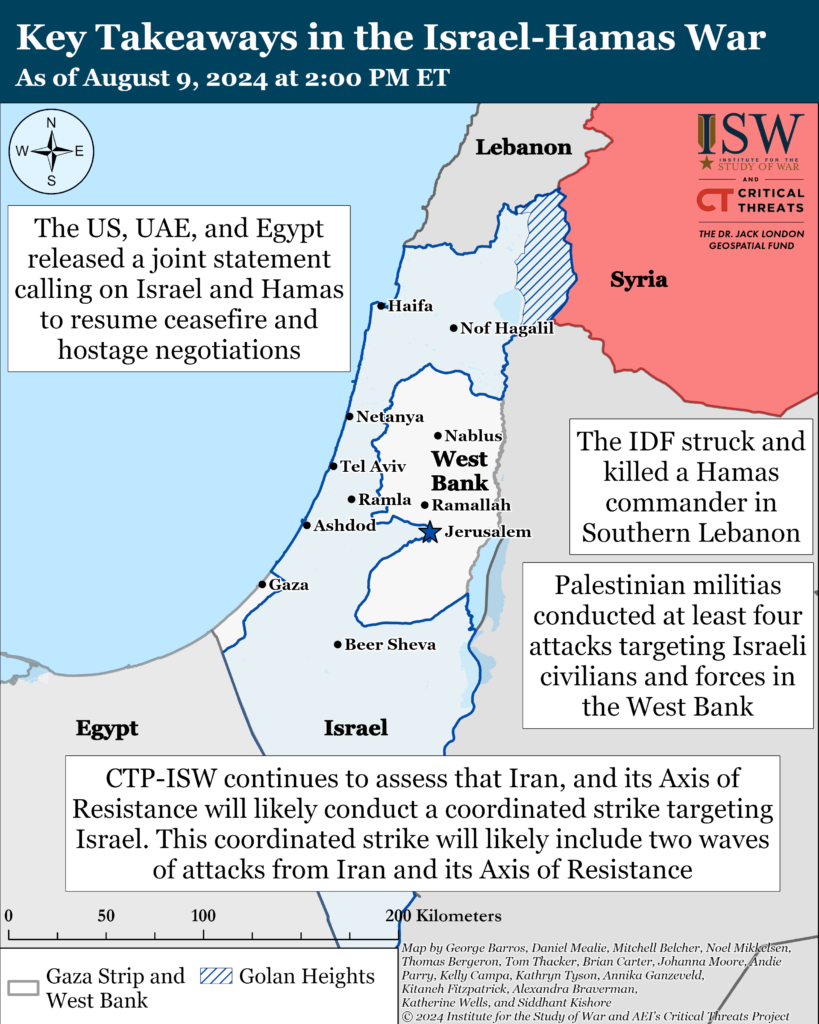
Gaza Strip
Axis of Resistance objectives:
Erode the will of the Israeli political establishment and public to sustain clearing operations in the Gaza Strip
Reestablish Hamas as the governing authority in the Gaza Strip
The Israel Defense Forces (IDF) 98th Division launched a new clearing operation in Khan Younis on August 8 to disrupt Hamas’ efforts to reconstitute in the area.[xxxv] The IDF issued evacuation orders for civilians in central and eastern Khan Younis on August 8.[xxxvi] The IDF said it was following intelligence that indicated Palestinian fighters and militia infrastructure were present in Khan Younis.[xxxvii] The 7th and 35th Paratroopers brigades deployed to Khan Younis to conduct clearing operations above and below ground and destroy weapons and militia infrastructure.[xxxviii] The IDF Air Force, in coordination with ground forces’ entry into Khan Younis, struck over 30 Hamas targets in the area, including weapons depots and militia compounds.[xxxix] IDF Air Force fighter jets, combat helicopters, and other aircraft targeted and killed Palestinian fighters in the area, including Palestinian fighters that fired small arms and mortars targeting Israeli forces and Israeli territory. Palestinian sources reported that IDF air struck targets in neighborhoods across eastern Khan Younis, including Abasan al Jadida, Abasan al Kabira, al Fukhari, Tahlia, and al Zanna.[xl] The IDF dropped leaflets over Khan Younis asking Palestinians to contact the IDF with reliable information on Hamas leaders’ locations, according to a Palestinian journalist.[xli]
The 98th Division conducted the previous two IDF clearing operations in Khan Younis.[xlii] The 98th Division’s most recent operation ended on July 30.[xliii] Israeli Army Radio reported in June that Hamas is continuing to manufacture weapons in Khan Younis as part of its effort to regenerate forces there.[xliv] CTP-ISW reported on August 8 that Hamas’ Khan Younis Brigade is building improvised explosive devices from unexploded ordinance as part of this effort.[xlv]
The IDF 252nd Division continued clearing operations along the Netzarim Corridor, south of Gaza City on August 9. The IDF 3rd “Alexandroni” Brigade (Res.), 16th Infantry Brigade (Res.), 10th Infantry Brigade (Res.), and 454th Artillery Brigade (Res.) continued to operate along the corridor.[xlvi] The Alexandroni and 16th brigades located underground tunnels, killed ”hundreds” of Palestinian fighters and destroyed militia infrastructure along the corridor in recent weeks.[xlvii] Southern Command’s Engineering Division and Yahalom Combat Engineering Corps located and destroyed a three-kilometer-long multi-story underground tunnel that extends three kilometers long north of Bureij, approximately 2.5 kilometers away from the Netzarim Corridor.[xlviii] Israeli forces discovered a number of rooms, weapons, and sufficient supplies for long stays in the tunnels.[xlix]
The IDF 162nd Division continued clearing operations in Rafah on August 9. The IDF Nahal and Givati brigades destroyed weapons and militia infrastructure in Rafah.[l] Israeli forces killed dozens of Palestinian fighters in the area in close quarters combat and with airstrikes, shelling, and sniper fire.[li] Israeli forces identified several fighters attempting to fire rocket-propelled grenades targeting Israeli forces and killed the fighters with tank fire.[lii] Hamas fighters fired thermobaric rockets targeting an IDF unit positioned in a building in Tal al Sultan.[liii]
The IDF Air Force struck approximately 60 militia targets across the Gaza Strip over the past day, including military buildings, weapons, and other militia infrastructure.[liv]
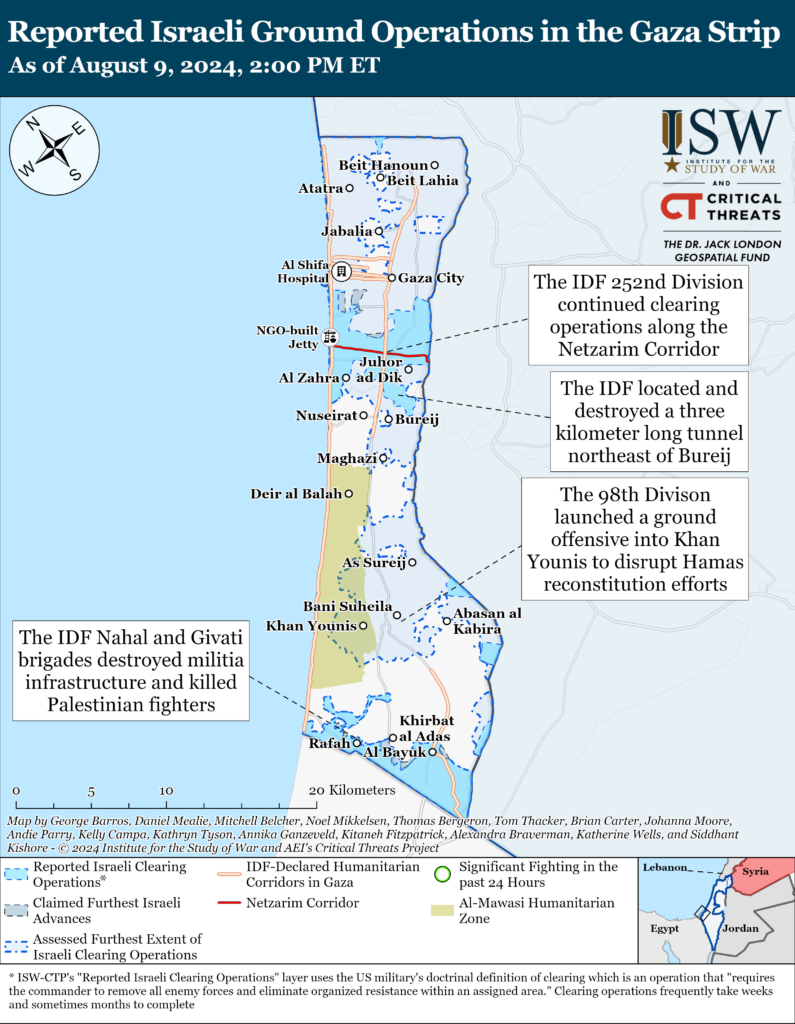
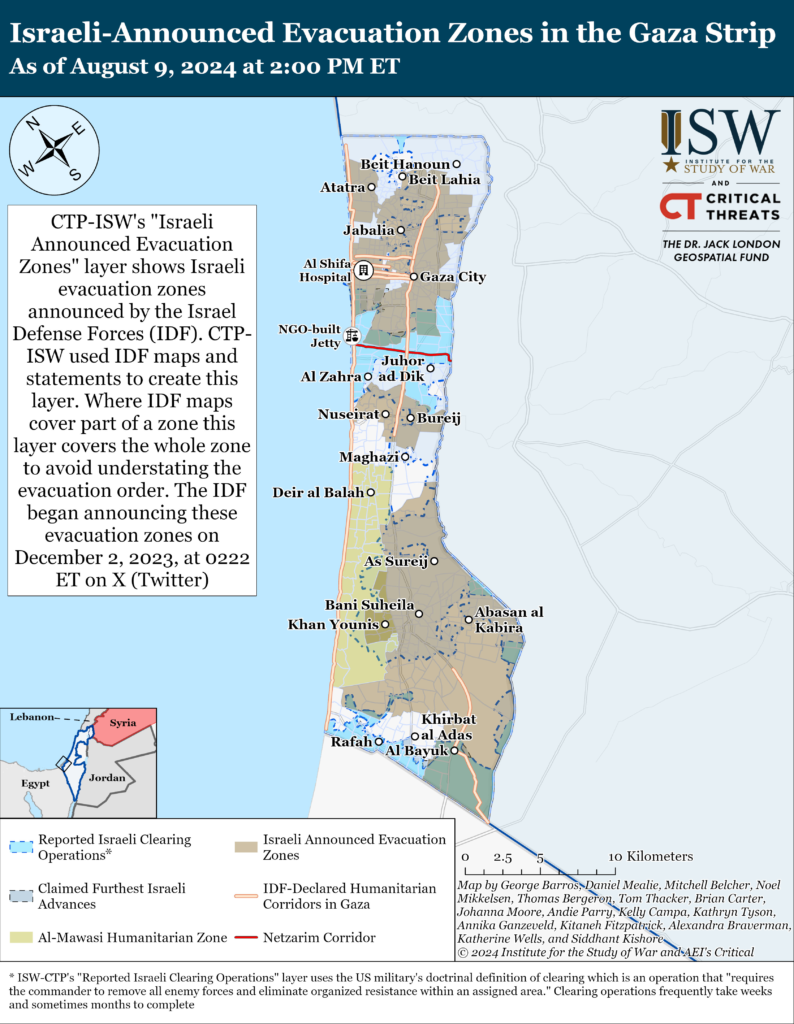
Palestinian militias in the Gaza Strip conducted at least three attacks targeting sites in southern Israel on August 9. The IDF intercepted one rocket that activated warnings near Ashkelon.[lv] Israeli Army Radio reported that two launches landed in open areas near Kissufim and Ein HaShlosha.[lvi]
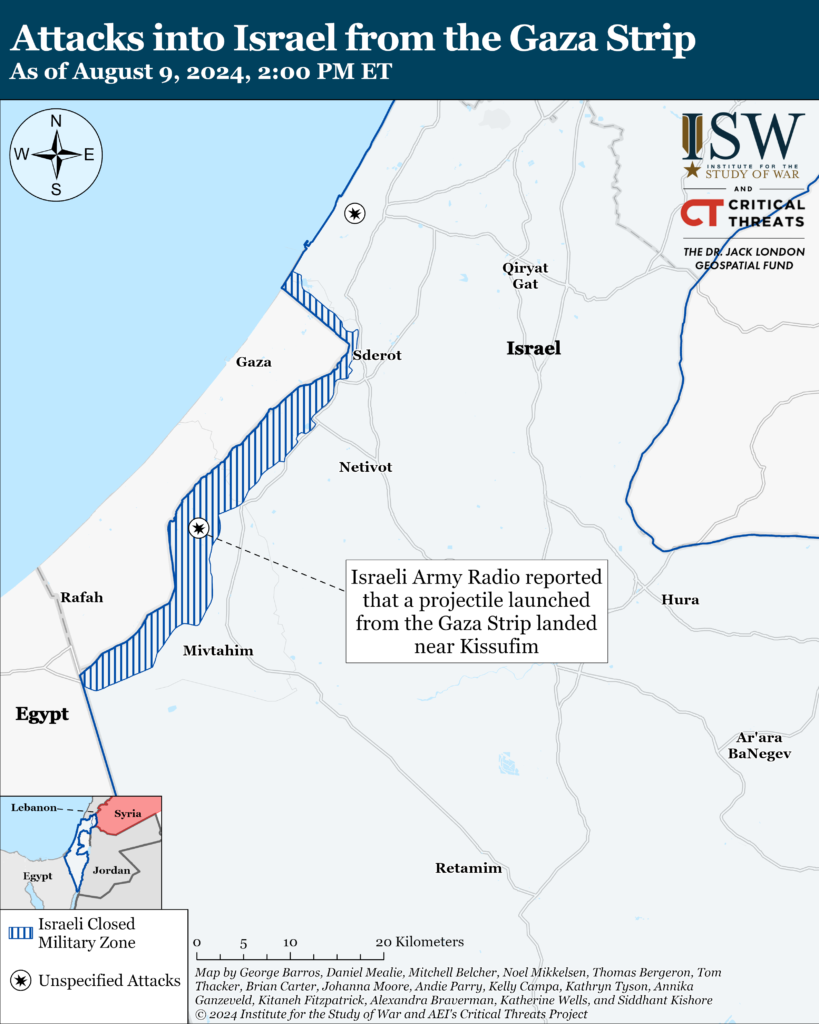
Recorded reports of attacks; CTP-ISW cannot independently verify impact.
Hamas spokesperson Abu Obeida issued a statement pledging the al Qassem Brigades’ allegiance to Yahya Sinwar on August 9.[lvii] Abu Obeida declared that the al Qassem Brigades are fully ready to implement Sinwar’s orders.[lviii] Abu Obeida also said that Sinwar’s selection represented Hamas’ cohesion and strength.[lix]
Hamas officials met with a Popular Front for the Liberation of Palestine (PFLP) delegation to discuss coordinating efforts to achieve Palestinian statehood in Doha, Qatar, on August 9.[lx] Senior Hamas leader Hossam Badran and PFLP Deputy Secretary General Jamil Mazhar attended the meeting.[lxi] The two delegations shared condolences over Ismail Haniyeh’s death, discussed the close relations that historically tie Hama and the PFLP, and agreed to continue ongoing meetings to discuss the Palestinian cause.[lxii]
West Bank
Axis of Resistance objectives:
Establish the West Bank as a viable front against Israel
Palestinian militias conducted at least four attacks targeting Israeli civilians and forces in the West Bank and inside Israel since CTP-ISW’s last data cut-off on August 8.[lxiii] The al Aqsa Martyrs’ Brigades fired small arms targeting the Nitzanei Oz checkpoint west of Tulkarm along the Israel-West Bank boundary.[lxiv] The al Aqsa Martyrs’ Brigades conducted three simultaneous attacks targeting multiple locations along the northern West Bank boundary and inside Israel, indicating some level of coordination between three elements. The al Aqsa Martyrs’ Brigades claimed that it “simultaneously” conducted three separate attacks targeting two Israeli towns of Gan Ner and Meirav, and an IDF checkpoint near Jalamah in the West Bank.[lxv] The al Aqsa Martyrs’ Brigades reportedly fired small arms targeting the two Israeli towns of Gan Ner and Meirav from across the border in the West Bank.[lxvi] The cell that fired on Meirav from the West Bank was roughly 10 kilometers away from the other two cells near Jalamah and Gan Ner, which are adjacent to one another and separated by the border wall. The distance between the cellsis indicates that the cells developed a plan prior to the attacks to conduct them simultaneously.
The US secretary of state decided to end the State Department’s investigation into an IDF battalion for human rights violations after the IDF addressed US concerns. Two unspecified US and Israeli officials told Axios that US Secretary of State Antony Blinken told Israeli Defense Minister Yoav Gallant that the US State Department decided to end its investigation into the IDF Netzah Yehuda Battalion.[lxvii] The US officials said that Israel provided substantial evidence showing that the IDF investigated the two personnel involved in the incident and discharged them from combat missions. The United States determined unspecified additional steps taken by the IDF to discipline those responsible for the violations addressed US concerns.[lxviii] The Netzah Yehuda Battalion is an ultra-orthodox IDF unit that operates mostly in the West Bank.[lxix] The State Department had been investigating the Netzah Yehuda Battalion for human rights violations. Blinken was planning to announce that the United States will ban US military assistance to the Netzah Yehuda Battalion citing the 1997 Leahy Law, after Israel did not effectively investigate the Battalion for the accused violations.[lxx] The Leahy Law makes it illegal for the US government to fund assistance for foreign security forces in which there is credible information that implicates a unit in the gross violation of human rights.[lxxi]
This map is not an exhaustive depiction of clashes and demonstrations in the West Bank.
Southern Lebanon and Golan Heights
Axis of Resistance objectives:
Deter Israel from conducting a ground operation into Lebanon
Prepare for an expanded and protracted conflict with Israel in the near term
Expel the United States from Syria
Lebanese Hezbollah conducted at least nine attacks into northern Israel since CTP-ISW’s last data cut-off on August 8.[lxxii] Hezbollah conducted three separate attacks targeting Kiryat Shmona on August 9.[lxxiii] Hezbollah targeted Kiryat Shmona with rockets that fell into open areas near the town in the first attack..[lxxiv] Hezbollah fired a second barrage of rockets targeting the headquarters of the IDF 769th Brigade near Kiryat Shmona.[lxxv] The IDF intercepted most of the rockets with at least two causing property damage.[lxxvi] Hezbollah also launched an attack targeting Kiryat Shmona with unspecified weapons.[lxxvii] Hezbollah separately launched two anti-tank guided missiles targeting IDF soldiers near Manara, impacting buildings nearby.[lxxviii]
The IDF struck and killed a Hamas commander, Samer Mahmoud al Haj, in Southern Lebanon on August 9.[lxxix] The IDF said that Haj was responsible for executing attacks into Israel from Southern Lebanon.[lxxx] The IDF said that Haj commanded military forces in Ein al Halwa camp near Sidon, Lebanon and helped with the recruitment and training of operatives for attacks.[lxxxi] Hamas confirmed Haj’s death in southern Lebanon.[lxxxii] Hezbollah harbors Hamas and Palestinian Islamic Jihad (PIJ) officials in Lebanon and permits them to conduct attacks into Israel. Both Hamas and PIJ have conducted several cross-border attacks into northern Israel from Lebanon since October 7.[lxxxiii] The IDF has previously killed Hamas commanders and officials in southern Lebanon, including most recently senior Hamas leader Mohammed Jabara on July 18.[lxxxiv]
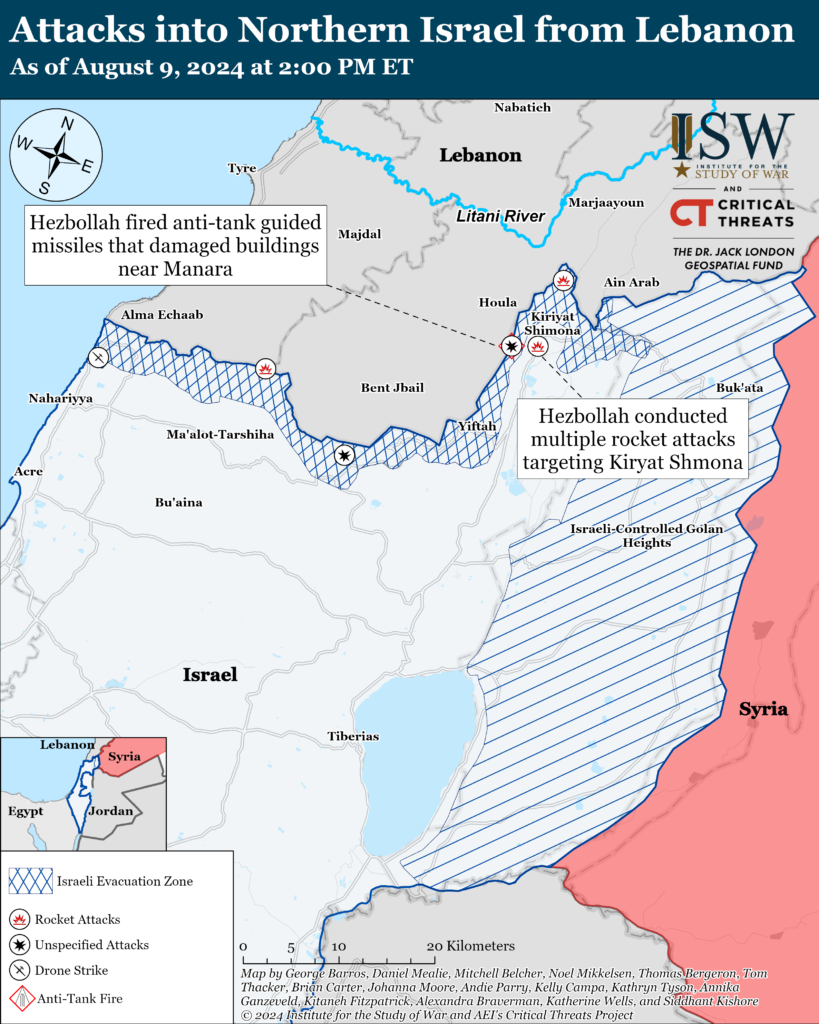
Iran and the Axis of Resistance
The IRGC Navy said that it added 2,654 military systems, including long-range and medium-range missiles, combat and reconnaissance drones, and electronic warfare units, to its inventory on August 9.[lxxxv] IRGC Commander Major General Hossein Salami stated that Iran must be able to confront its adversaries “in the depths of the seas and oceans at any desired point.”[lxxxvi] IRGC Navy Commander Rear Admiral Ali Reza Tangsiri similarly stated on July 30 that the IRGC Navy seeks to “expand the geography of [its] missions” and conduct “ocean operations” with the Artesh Navy.
Iranian Acting Foreign Affairs Minister Ali Bagheri Kani met with Somalian Foreign Affairs Minister Ahmed Moalim Fiqi on August 8 the sidelines of the emergency Organization of Islamic Cooperation (OIC) meeting in Jeddah, Saudi Arabia.[lxxxvii] Bagheri Kani claimed that Israel is a threat to “the entire Islamic nation” and stressed the importance of Islamic countries maintaining a strong relationship. Ahmed offered his condolences for the death of Hamas Political Bureau Chairman Ismail Haniyeh, adding that the operation that killed Haniyeh in Tehran was a violation of Iranian sovereignty. Both ministers expressed a desire to develop bilateral relations.
Syrian Ministry of Defense reported that the IDF Air Force conducted an airstrike on August 8 targeting Syrian Arab Army (SAA) infrastructure and personnel in Homs, in Central Syria.[lxxxviii] The IDF reportedly struck an SAA ammunition depot near Shayrat Airbase in Homs.[lxxxix] A Syrian analyst focused on tracking casualties in Syria cited Syrian regime Facebook pages that reported that the airstrike caused large numbers of casualties among the SAA and Iranian-backed militias.[xc] The Syrian Defense Minister claimed that only four SAA personnel were injured in the strike, however.[xci] A pro-Syrian regime source assessed that intensified IDF airstrikes near Shayrat Airbase have destroyed a large number of Syrian Arab Army’s air defense systems near the base in the last two years.[xcii] Iran reportedly controls Shayrat Airbase.[xciii] CTP-ISW reported in February 2024 that IRGC and elements of Lebanese Hezbollah conducted training for Russian forces on Iranian-made drones in Shayrat airbase.[xciv] The IDF has not commented on the August 8 attack at the time of this writing. The IDF previously conducted an airstrike that struck an Iranian precision-guided munition cache at Shayrat Airbase in November 2023.[xcv]
Likely Houthi fighters conducted three attacks targeting the Liberian-flagged Delta Blue oil tanker in the Bab al Mandab on August 9.[xcvi] The United Kingdom Maritime Trade Operations (UKMTO) reported that a missile exploded near the Delta Blue.[xcvii] The Delta Blue subsequently reported an uncrewed surface vessel (USV) attack.[xcviii] The Delta Blue’s Armed Security Team “opened fire [on the USV] and [were] able to successfully destroy the vehicle.”[xcix] The Delta Blue finally reported another missile attack.[c] UKMTO previously reported on August 8 that small crafts carrying four unidentified individuals launched a rocket-propelled grenade (RPG) at an unspecified vessel in the Red Sea.[ci] Western media confirmed on August 9 that the unidentified individuals were targeting the Delta Blue, bringing the total number of attacks targeting the Delta Blue between August 8 and 9 to four attacks.[cii]
US Central Command (CENTCOM) destroyed two Houthi anti-ship cruise missiles and one Houthi ground control station in Houthi-controlled areas of Yemen on August 8.[ciii] CENTCOM also destroyed one Houthi uncrewed surface vessel in the Red Sea.
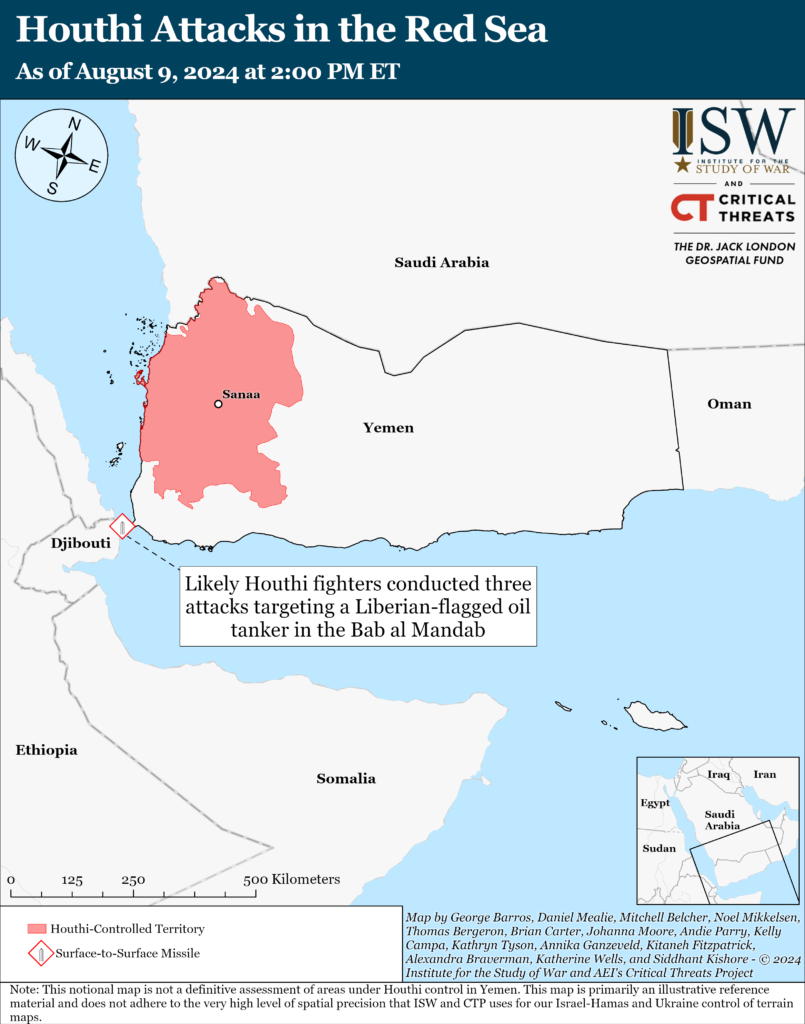
 Eurasia Press & News
Eurasia Press & News


